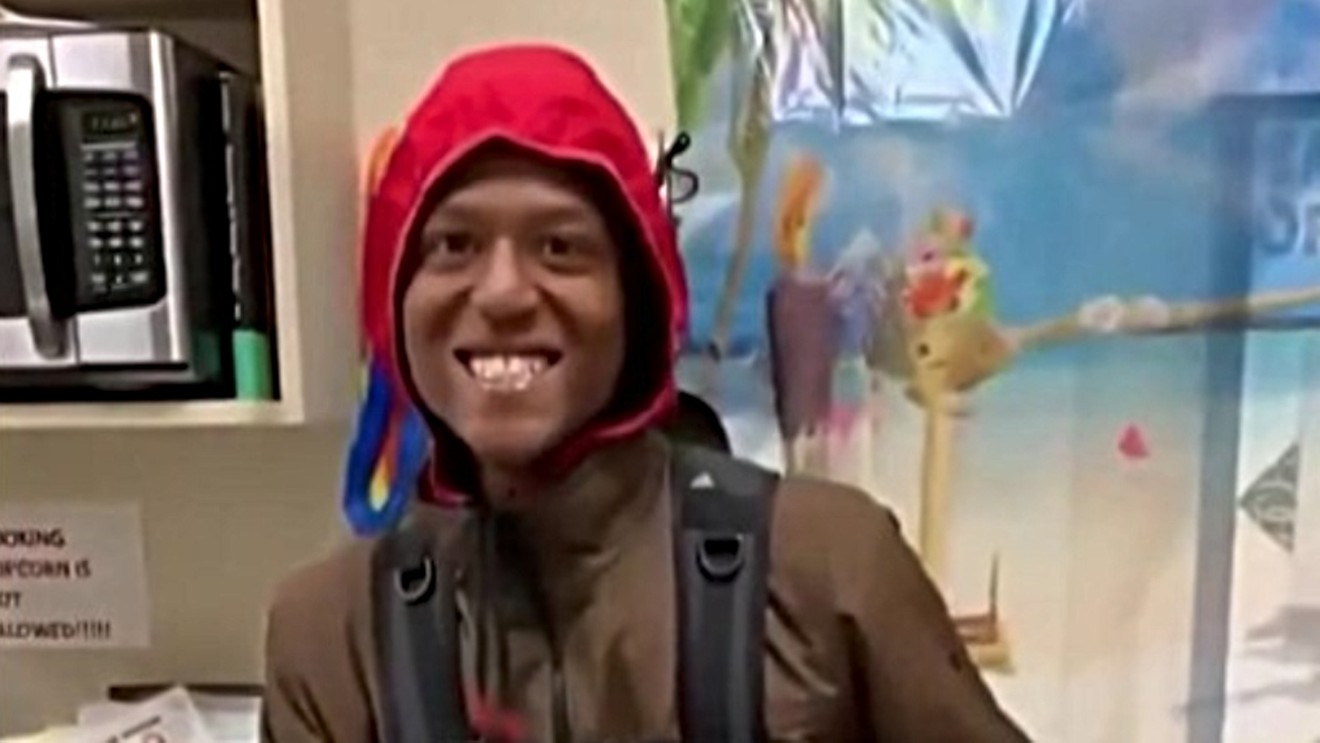There's no shortage of cases related to the Aurora police's approach to race that deserve further scrutiny. In January 2019, ten months before McClain's passing, we documented allegations of abuse by APD cops against thirteen people of color since 2003, resulting in settlements totaling around $4.6 million.
Here's the joint statement about the current inquiry, released under the auspices of the FBI, the Justice Department and U.S. Attorney Jason Dunn:
The standard practice of the Department of Justice is to not discuss the existence or progress of ongoing investigations. However, there are specific cases in which doing so is warranted if such information is in the best interest of the public and public safety. Recent attention on the death of Elijah McClain warrants such disclosure.Dunn's track record in regard to controversial police incidents isn't filled with bold action. On March 27, in a development that received little attention amid breaking news of the COVID-19 pandemic, Dunn declined to intervene in the killing of teenager De'Von Bailey, who was shot in the back by a Colorado Springs police officer while running away. "The FBI’s Denver Field Office reviewed the facts and circumstances surrounding the shooting of De'Von Bailey on August 3, 2019," Dunn reported. "Following the FBI’s review, the U.S. Attorney’s Office also reviewed those facts and circumstances to make a prosecution determination. Both offices concluded that the fatal shooting of Mr. Bailey, although undoubtedly devastating to his family, friends and community, did not result from any willful violation of Mr. Bailey’s constitutional rights. Therefore, the U.S. Attorney’s Office will not pursue criminal charges."
The FBI-Denver Division and the U.S. Attorney’s Office for the District of Colorado began reviewing the facts for a potential federal civil rights investigation in 2019. In addition, the Department of Justice’s Civil Rights Division has been notified and has been involved in this review. The matter is ongoing, and we are in the process of gathering additional evidence from the Aurora Police Department and other parties. To date, the City of Aurora has been cooperating.
We are also aware of recent media reports about Aurora police officers being placed on administrative leave pending an internal investigation into a photograph in which those officers appeared. We are gathering further information about that incident to determine whether a federal civil rights investigation is warranted.
We will have no further comment until both of those reviews are completed.
Likewise, President Donald Trump has proven to be infinitely less aggressive when it comes to oversight of police departments with dubious racial histories than was the administration of his predecessor, Barack Obama.
Should Dunn and company be serious about analyzing Aurora's recent history, though, they should start by taking a look at a lawsuit filed by the ACLU of Colorado on behalf of Jaime Alberto Torres, who was pummeled by APD officers in November 2017 despite having committed no crime — as was true in McClain's case, too.
To demonstrate that the Aurora police have a pattern and practice of using excessive force against people of color, the ACLU assembled a graphic highlighting thirteen other examples, many of which Westword had covered.
In June 2011, we wrote about the fatal shooting of Juan Contreras outside a Family Dollar Store. Police wrongly suspected Contreras of committing a minor crime; Aurora later paid a $400,000 settlement. Less than two years later, in February 2013, we reported on a $100,000 settlement made after cops responding to a call regarding Rickey Burrell broke his wrist — even though he was already unconscious after suffering a seizure.
In November 2016, Aurora dispensed $2.6 million to settle the fatal shooting of Naeschylus Vinzant by Aurora police officer Paul Jerothe the previous year. The following July, Darsean Kelley, whom the ACLU's Mark Silverstein told us "was basically stopped for walking while black and then tased in the back while he was saying 'I know my rights,'" took home a $110,000 settlement.
In May 2018, Aurora forked over $335,000 to settle a lawsuit filed against three members of the Aurora Police Department by OyZhana Williams regarding a 2015 run-in during which she had her head stomped in the parking lot of a hospital where her boyfriend was being treated for a gunshot wound, apparently because a cop lauded for heroism during the aftermath of the Aurora theater shooting didn't like the way she dropped her keys. And in the months that followed, Omar Hassan, whom officers told to leave a coffee shop for ordering a muffin while wearing a hoodie, and Dwight Crews, roughed up by APD members after he reacted to the prospect of his cat slipping out of the house, received settlements of $40,000 and $35,000, respectively.
Here's the ACLU graphic:
The five other cases mentioned by the ACLU (in addition to the one involving Torres) began with the fatal December 2003 shooting of Jamaal Bonner during a prostitution sting. Settlement amount: $610,000.
Next came a June 2006 incident during which twelve-year-old Cassidy Tate was choked, slapped and thrown to the ground, fracturing her shoulder, during a disagreement over a handicapped parking spot. In addition, a cop was caught on video calling African-Americans "Alabama porch monkeys." Settlement amount: $175,000.
In February 2009, Carla Meza was kicked in the head while handcuffed, suffering a broken eye socket in the process, during a domestic-violence call. Settlement amount: $85,000.
Brandon Washington is said to have been tased and assaulted following an April 2017 car accident in which he was involved. No settlement in that case, but the charges against him were dropped.
And in July 2017, Vanessa Peoples's shoulder was dislocated after she was hogtied during a welfare check on her mother. Settlement amount: $100,000.
This baker's dozen of startling cases strongly suggests that the attack on McClain wasn't an isolated incident. But there's no guarantee that Dunn and his federal colleagues will agree.













